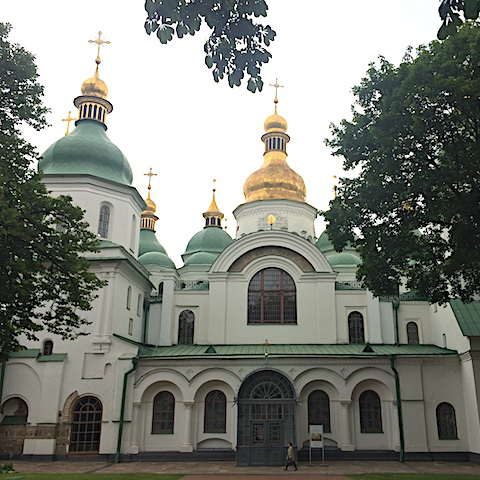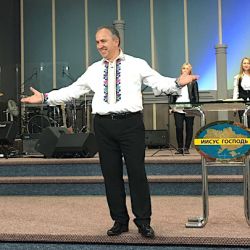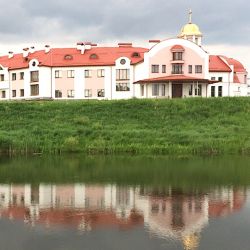The Orthodox Church is the majority in the Ukraine, but it is divided. Will the prospect of the year 2033 encourage the three Orthodox Churches to march towards more unity? What is the meaning of the anniversary of the two thousand years of Christ's resurrection in the dramatic context of the Ukraine, where society is divided, as well as the Church?
As part of the project “Jesus Celebration 2033” (JC 2033) Olivier Fleury, Raphael Lods and Martin Hoegger, go to the Laure (or monastery) of Kiev, the spiritual center of Ukraine to meet Father Mykolay Danylevych, head of the Department of External Relations of the Ukrainian Orthodox Church which is connected to the Moscow Patriarchate.
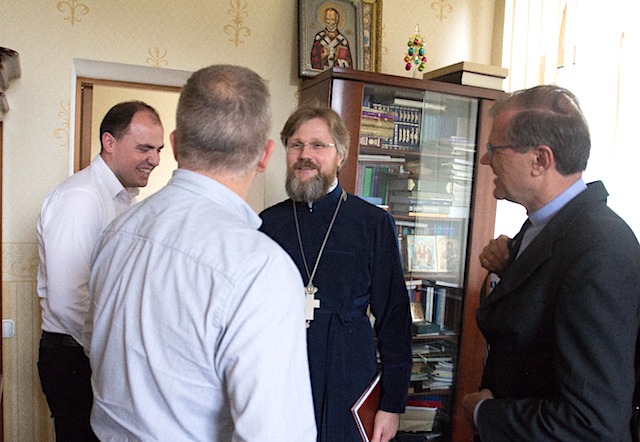 M. Danylevych
M. Danylevych
“This is our first meeting and we will stay in touch with each other. Our Church wishes to prepare this anniversary as it did in the year 2000. And it must be done at an interchurch level”, said the young and smiling priest from the outset.
After learning that we had recently met Patriarch Bartholomew, our talk forks on the delicate issue of unifying the date of Easter that we had discussed with him. “The trend is conservative in our church. It will be difficult to change dates. But the bottom line is that everyone, in their own confession, live their spiritual life with Christ in the center. Then the barriers disappear”.
At the end of the interview, his assistant Vitaliy Horzov takes us to visit Kiev Lavra, the center of Ukrainian history, especially the amazing caves where several saints rest. Joy to discover that he has just spent a year training at the Ecumenical Institute of Bossey, where I also studied!
A medal for JC2033
The second meeting took place at the Monastery of St. Michael's Golden Dome with Fr.Vitali Danchak, secretary of the Patriarch of the Autocephalous Orthodox Church, a second Orthodox Church that separated from the Moscow Patriarchate in 1921.
An amazing interview! Father Vitali shared with us the sufferings of his Church, then Olivier asked him this question: “How did you meet Christ and receive the conviction of becoming a priest”? He paused and the conversation changed. “I do not think anyone asked me that question”, he answers with his heart. At the age of five, he was touched by God in a church he visited with his grandmother and at fifteen he received the call to become a priest.
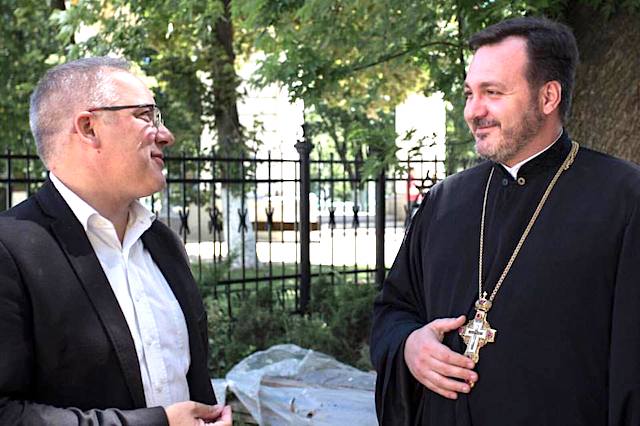 Vitali Danchak
Vitali Danchak
After presenting the project JC2033 to him, he asks several questions, surprised by such an initiative. But also, very happy, so much so that he wants to come to Switzerland to give us a distinction from his Church!
Father Vitali is fighting for the value of the family. At the end of the interview he invites us to the “Walk for the Family” which passes in front of the monastery. Organized by the Evangelical Churches, it is attended by various Christian families and also by Muslims.
Everything is possible with the Holy Spirit
In Lviv, west of this great country, we meet a bishop of a third Orthodox Church, Bishop Dymytrij Rudiuk, of the "Patriarchate of Kiev" (appeared in 1992). “The date of Easter is a more political than ecclesial issue”, he says. “What is important is to listen to people who do not understand why there are two different dates. This year, the date was common between Orthodox, Catholics and Protestants. It was a good sign. Celebrate Christmas and Easter together? Everything is possible with the Holy Spirit!”
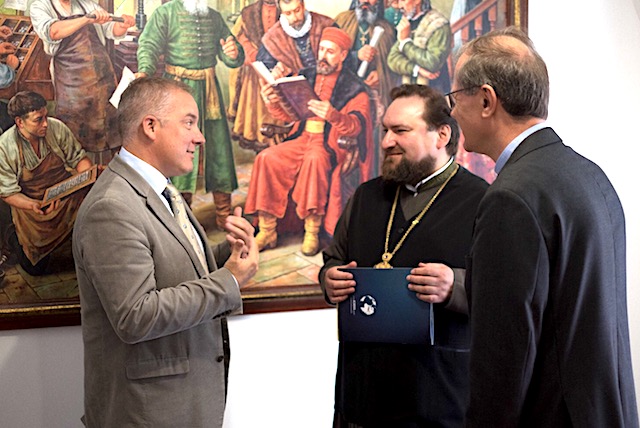 Dymytrij Rudiuk
Dymytrij Rudiuk
How does he see the prospect of a celebration in 2033 and the future of church relations in the Ukraine? He emphasizes the importance of witnessing our faith together in a secular context. “This common testimony will unite us. Under the action of the Holy Spirit, we will be led to a celebration that may take place under new conditions. Not the unity we live now or want, but the one that the Holy Spirit will want”.
Convinced of the importance of being together to testify and to find new approaches, he regretted, however, that the Kiev Patriarchate was not recognized and invited to major events.
What would he do to make the 2000 years of the resurrection of Christ something alive? Make a clip to show the beauty of the resurrection in orthodoxy. Highlight local traditions, such as decorating eggs. Deepen the spiritual and theological sense of Easter. To make you want to see how Easter is celebrated in the various churches. Involve the hierarchy, but also and especially the youth associations. Do not forget the seminaries and faculties of theology, which form the clergy of the future.
Together our testimony will be stronger
In the absence of the Bishop of Lviv, Philaretus, of the Ukrainian Orthodox Church (the same one we visited in Kiev Lavra), Fr. Markijan Kayumov, Head of Communications, receives us in the Episcopal Office.
Seeing the vision of JC2033, Father Markijan remembers with joy the gathering in Kiev during the jubilee of the year 2000. After the liturgies in the Kiev Lavra and the catholic cathedral, the faithful of these two churches gathered in a large square: “It was the first time such an initiative had taken place. One could feel the Holy Spirit”.
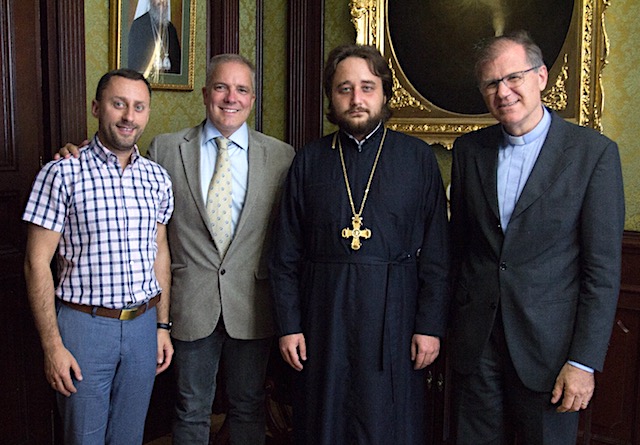 Markijan Kayumov
Markijan Kayumov
He explains to us that in the Ukraine the question of the unity of the Orthodox Church is crucial. She must think before entering any interfaith project. The challenge is both to keep the Orthodox identity and to witness in an increasingly secularized society. In this context, he considers that the initiative of a celebration in 2033 is necessary to cultivate friendship with the other Churches and to testify of Christ. Of course, the hierarchy must decide but he thinks it will be approved.
“This project must be a movement of faith, lead people to Christ. This wonderful initiative can also be a way to unify the churches in the Ukraine. I will do my best to develop it. Indeed, we have to be more active witnesses. And together our testimony will be stronger, even if our rituals are different”.

